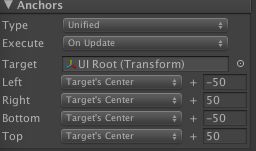NGUI内核大剖析(一) UIRect
UIRect是UIPanel和UIWidget的基类,研究好前者,才能更方便的研究后两者,所以我将它做为本系列的第一篇。
(注:本系列讨论的NGUI版本为3.10.0)
首先要知道的一点是,UIRect是一个abstract class,也就是抽象类,它不能被实例化。它为UIPanel和UIWidget提供了一些公用的方法,这些方法通过AnchorPoint设置后两者的矩形区域。
在UIRect的最开始,我们看到有一个Inner Class叫做AnchorPoint。结构很简单,类函数的算法也都很简单,具体的用途我们暂时不讲,后面会提到。唯一要注意的是,在set方法里,我们看到:
this.absolute = Mathf.FloorToInt(absolute + 0.5f);这其实就等同于
this.absolute = Mathf.RoundToInt(absolute);接着往下看
///
/// Left side anchor.
///
public AnchorPoint leftAnchor = new AnchorPoint();
///
/// Right side anchor.
///
public AnchorPoint rightAnchor = new AnchorPoint(1f);
///
/// Bottom side anchor.
///
public AnchorPoint bottomAnchor = new AnchorPoint();
///
/// Top side anchor.
///
public AnchorPoint topAnchor = new AnchorPoint(1f);定义了四个AnchorPoint类型的变量,分别对应左右下上四个位置的Anchor Point,也就是锚点。具体是什么,我们就要结合在Unity Editor里面的应用来看了。
新建一个widget,把Anchors里的Type改成Unified或者Advanced,我们就可以自行调节Anchor Point了。Unified和Advanced区别在于,Unified统一指定一个Transform为target,而Advanced可以为左右下上每一个Anchor Point指定一个Transform为target。我们这里以Unified为例:

如图所示,以UI Root为Target,所谓Target其实就是参考系的载体,真正的参考系是图中的Target‘s Center也就是UI Root的中心位置。可以这么理解,UIWidget的左边在UI Root(水平)中心点的x坐标-50的位置,右边在UI Root(水平)中心点的x坐标+50的位置,Bottom和Top与之类似。
通过调节Left,Right,Bottom,Top后面的值,我们可以看到UIWidget的Position和Size在变化,而Scene里面所示的UIWidget的区域也随之增大减小。
至于参考系下拉菜单里的其他选项,其实都是取Target的不同位置(Set To Current Position是一个快捷方法,把参考系拉倒和UIWidget当前位置重叠的UIRoot的位置上),以达到UI可以根据屏幕大小自适应变化的目的。当然,前面说“位置”,其实并不准确,准确的来讲其实是位置除以尺寸,我们姑且称之为
参考系比例
。
关于屏幕自适应,有机会的话,我们会在后续的文章中讲到。
回到代码中,看SetAnchor及其几个重载的方法,我们拿参数列表最长的为例
///
/// Anchor this rectangle to the specified transform.
///
public void SetAnchor (GameObject go,
float left, int leftOffset,
float bottom, int bottomOffset,
float right, int rightOffset,
float top, int topOffset)
{
Transform t = (go != null) ? go.transform : null;
leftAnchor.target = t;
rightAnchor.target = t;
topAnchor.target = t;
bottomAnchor.target = t;
leftAnchor.relative = left;
rightAnchor.relative = right;
bottomAnchor.relative = bottom;
topAnchor.relative = top;
leftAnchor.absolute = leftOffset;
rightAnchor.absolute = rightOffset;
bottomAnchor.absolute = bottomOffset;
topAnchor.absolute = topOffset;
ResetAnchors();
UpdateAnchors();
}target对应的就是Editor中的target,relative对应的是参考系比例(center为0.5f,left和bottom为0,right和top为1),absolute对应的就是相对坐标。
设置完参数之后,就重置并更新Anchors。
我们回头看AnchorPoint这个Inner Class里的几个方法。
Set不必多说就是设置参考系比例和相对坐标。
SetToNearest实在UIRectEditor里用到,给出相对于三个参考系比例(默认0,0.5f,1)的相对坐标,取最小值所对应的参考系比例。
SetHorizontal根据某个transform计算出新的横向偏移量(参考系比例不变)。SetVertical同理。
GetSide获取相对于某个transform的坐标。一般会调用UIRect的GetSides,后面我们会讲到。
回到之前的编辑器截图
我们还差了一个Execute的参数没有讲,这个对应了下面这段代码
public enum AnchorUpdate
{
OnEnable,
OnUpdate,
OnStart,
}
///
/// Whether anchors will be recalculated on every update.
///
public AnchorUpdate updateAnchors = AnchorUpdate.OnUpdate;
OnStart是只更新一次,因为mUpdateAnchors默认值是true,OnEnable是在GameObject.setActive(true)或者这个组件enabled=true的时候调用OnEnable,令mUpdateAnchors = true 而OnUpdate是每个逻辑帧都会更新。
接下来是ResetAnchor
///
/// Ensure that all rect references are set correctly on the anchors.
///
public void ResetAnchors ()
{
mAnchorsCached = true;
leftAnchor.rect = (leftAnchor.target) ? leftAnchor.target.GetComponent() : null;
bottomAnchor.rect = (bottomAnchor.target) ? bottomAnchor.target.GetComponent() : null;
rightAnchor.rect = (rightAnchor.target) ? rightAnchor.target.GetComponent() : null;
topAnchor.rect = (topAnchor.target) ? topAnchor.target.GetComponent() : null;
mCam = NGUITools.FindCameraForLayer(cachedGameObject.layer);
FindCameraFor(leftAnchor);
FindCameraFor(bottomAnchor);
FindCameraFor(rightAnchor);
FindCameraFor(topAnchor);
mUpdateAnchors = true;
} /// Helper function that returns the distance to the camera's directional vector hitting the panel's plane.(cameraRayDistance)简单来讲就是camera和panel之间的距离。
/// Get the sides of the rectangle relative to the specified transform.
/// The order is left, top, right, bottom.
(GetSides)简单来讲就是获得矩形四条边相对于某个transfrom的坐标(x或y)
targetCamera是为了GetLocalPos这个方法准备的,我们也只看注释:
/// Helper function that gets the specified anchor's position relative to the chosen transform.获取某个anchor相对于某个transform的位置
UpdateAnchors这个方法里其实没什么,真正执行的是UpdateAnchorsInternal这个方法
///
/// Update anchors.
///
protected void UpdateAnchorsInternal (int frame)
{
mUpdateFrame = frame;
mUpdateAnchors = false;
bool anchored = false;
if (leftAnchor.target)
{
anchored = true;
if (leftAnchor.rect != null && leftAnchor.rect.mUpdateFrame != frame)
leftAnchor.rect.Update();
}
if (bottomAnchor.target)
{
anchored = true;
if (bottomAnchor.rect != null && bottomAnchor.rect.mUpdateFrame != frame)
bottomAnchor.rect.Update();
}
if (rightAnchor.target)
{
anchored = true;
if (rightAnchor.rect != null && rightAnchor.rect.mUpdateFrame != frame)
rightAnchor.rect.Update();
}
if (topAnchor.target)
{
anchored = true;
if (topAnchor.rect != null && topAnchor.rect.mUpdateFrame != frame)
topAnchor.rect.Update();
}
// Update the dimensions using anchors
if (anchored) OnAnchor();
}
然后调用每个anchor的rect(在ResetAnchors中取到的)的Update方法。
最后调用OnAnchor方法,OnAnchor是个abstract方法,具体实现在UIPanel和UIWidget(还有UIWidget的衍生类UILabel)里面,根据参考系和相对位置,计算位置和尺寸。
UIRect大概就讲到这里了,总结一下:UIRect是为UI组件描述其位置和尺寸信息,通过AnchorPoint来实现,根据目标参考系和相对位置来计算矩形区域的每一个边的位置。
最后可以加一个tips:
在OnEnable的时候会调用OnInit,UIRect的OnInit到没有什么可说的。
UIPanel里的OnInit在一堆初始化之中,有一句mRebuild = true,这会导致这个UIPanel里的所有UIDrawCall重建(具体我们会在UIPanel里讲到)。
UIWidget的OnInit有一句RemoveFromPanel(),并会调用OnUpdate(通过Update()),又会重新创建(寻找)panel(会导致这个Widget所属的UIDrawCall会被重建,甚至所有UIDrawCall重建),并会调用Invalidate更新Visibility和FinalAlpha,并且这个方法是递归的,意思就是所有的子Widget都会更新一遍。
所以GameObject.setActive还是慎重使用。